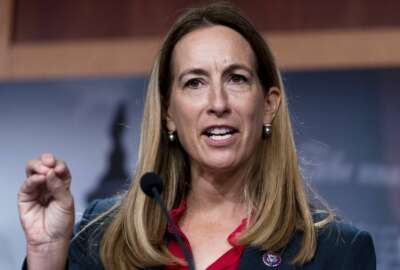FBI Special Agent indicted for making false statements about Oregon standoff
In today's Federal Newscast, an FBI Special Agent involved with the 2016 standoff at an Oregon wildlife refuge gets indicted for making false statements about an...
- A special agent for the FBI indicted for making false statements and obstructing justice during the armed occupation of the Malheur National Wildlife Refuge in Oregon. The Justice Department said Special Agent Joseph Astarita fired his weapon during the arrest of one of the occupiers, and then allegedly tried to cover it up. Asarita has plead not guilty on all counts. (Department of Justice)
- The House appropriations committee wants to cut the IRS by nearly $150 million. The committee’s fiscal 2018 financial services bill includes roughly $11 billion for the agency. The money will go in part to strengthening cybersecurity at the tax agency, along with fraud prevention and improving IT. The National Treasury Employees’ Union argued the cuts would jeopardize taxpayer compliance, and increase stress for agency employees. (House Appropriations Committee)
- The Senate version of the defense authorization bill authorizes $700 billion for the Defense Department and wars overseas. The bill will put the military pay raise at 2.1 percent. It also created a cyber war policy to allow the U.S. to use all possible instruments to respond to cyber attacks. (Federal News Radio)
- A key House committee voted to repeal the resolution that’s served as the legal underpinning for dozens of U.S. military actions overseas since the September 11 attacks. The amendment was offered by Rep. Barbara Lee (D-Calif.) – the only member of Congress who opposed the original authorization for the use of military force three days after the 9/11 attacks. She’s argued, unsuccessfully, for years that the resolution has turned into a blank check for presidents of both parties, so the lopsided vote in the House Appropriations Committee came as a surprise. (Federal News Radio)
- Congress has been quiet so far on federal employee civilian pay in the appropriations process for fiscal 2018. The House Appropriations Financial Services and General Government Subcommittee cleared its appropriations bill. It makes no mention of an alternate pay rate for civilian employees. No markup hearing has been scheduled yet. President Donald Trump proposed giving most civilian workers a one point nine percent pay raise in 2018. (Federal News Radio)
- President Donald Trump announced his intent to nominate Matt Donovan as undersecretary of the Air Force. Donovan is a former F-15 pilot who served in the Air Force from 1982 to 2008. He’s currently an advisor to Senate Armed Services Committee Chairman John McCain (R-Ariz.) on matters relating to military aircraft.
- A progress report was released just about a year into implementing the federal open source policy. 27 agencies have made software code available for anyone to use under the Code.gov platform. The Office of Management and Budget called for an Open Source Pilot Program last summer requiring agencies to release at least 20 percent of new custom-developed federal source code to the public. OMB said the goal is to make source code available for sharing and re-use across the government and private sector. The Social Security Administration has made the most code available with 26 projects, while the Transportation Department is second with 13. (Code.gov)
- Customs and Border Protection will roll out more pilots for its traveler verification service in airports across the country. Biometric exit programs started in Atlanta, and are now headed for Houston and Dulles International Airport. CBP wants to get to 10 locations. Director of Field Operations Dan Tanciar said airports are testing face, iris and fingerprint recognition capabilities. CBP wants to make those recognition systems interoperable with other components in the Homeland Security Department and the FBI’s Terrorist Screening Center. (Security Industry Association)
- The Government Accountability Office dinged the FCC for a program it said the agency can’t measure. GAO found the FCC cannot tell whether its Lifeline program is doing any good. It’s supposed to help low income people obtain broadband service, but the agency and its non-profit contractor lack basic controls … and can’t verify whether millions of subscribers even qualify. GAO criticized the FCC for keeping the $9 billion universal service fund in a private bank account. (Senate Homeland Security and Governmental Affairs Committee)
Copyright © 2025 Federal News Network. All rights reserved. This website is not intended for users located within the European Economic Area.
Eric White
Eric White is news anchor and Federal Drive producer at Federal News Network.
Follow @FEDERALNEWSCAST
Related Stories
Related Topics






